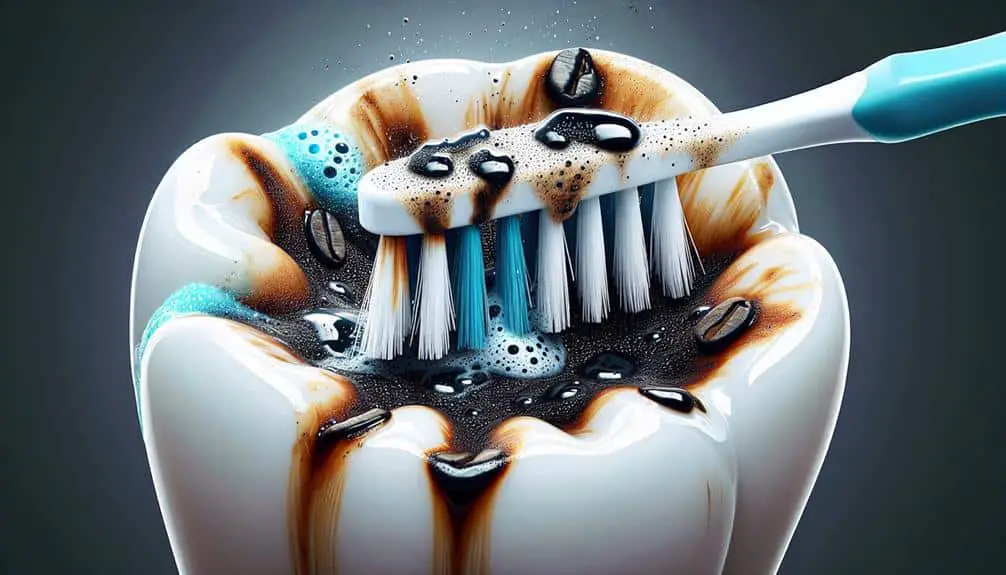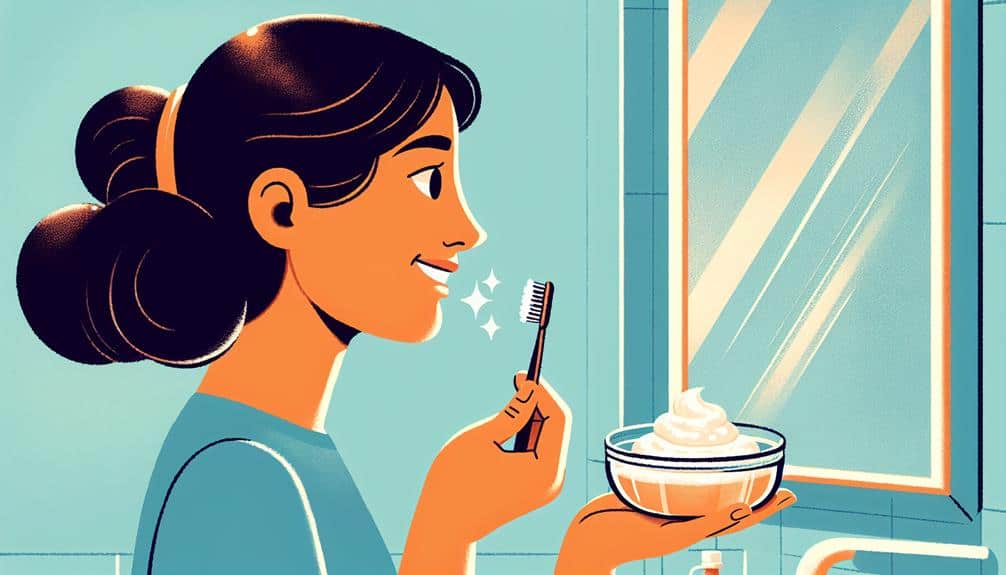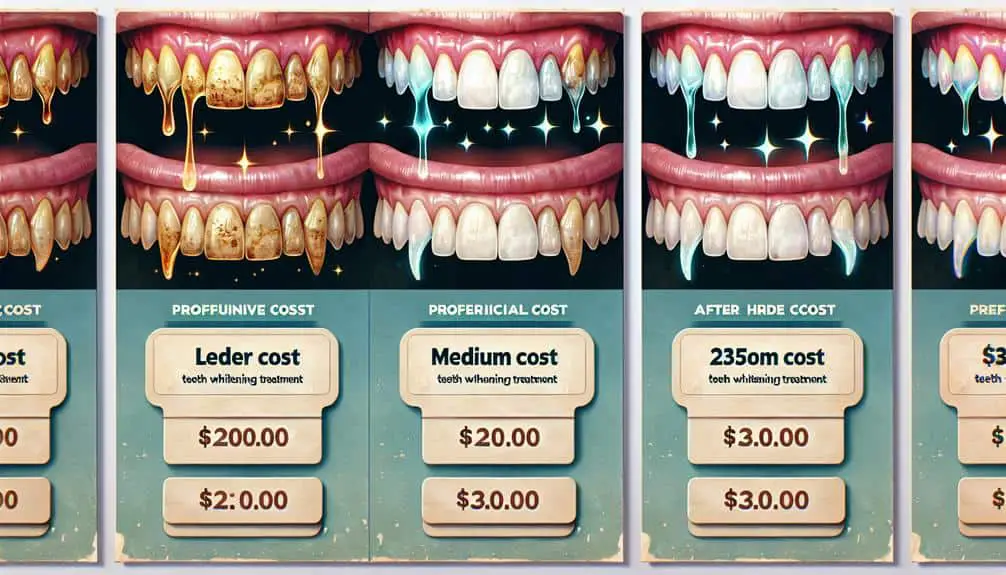Revitalize your smile by exploring top solutions for tough teeth stains. Consider professional laser treatments for quick and efficient results that protect enamel. At-home whitening kits with peroxide gels offer gradual whitening and convenient application. Whitening toothpaste and mouthwash can gently polish and brighten teeth, freshening breath and reducing bacteria. Natural remedies like oil pulling and baking soda paste can enhance the appearance of your teeth. Remember, consistent oral hygiene practices and regular dental check-ups play key roles in maintaining a radiant smile.
Key Points
- Laser treatment swiftly removes stubborn teeth stains with noticeable results in one session.
- Dentist-supervised bleaching sessions effectively lighten teeth color for a brighter smile.
- DIY whitening kits offer convenient and gradual whitening for tough stains at home.
- Whitening toothpaste and mouthwash help polish and lighten teeth for a fresher smile.
- Natural remedies like diet changes and oil pulling can aid in improving teeth appearance.
Professional Teeth Whitening Options
When considering professional teeth whitening options, you may find various treatments available through dental professionals that can effectively remove tough teeth stains. One popular method is laser treatment, which utilizes a focused light beam to target stubborn stains on your teeth. This procedure is often quick and efficient, providing noticeable results in just one session. Additionally, laser treatment is known for its precision and effectiveness in whitening teeth while also guaranteeing enamel protection.
Another common professional teeth whitening option involves bleaching sessions under dentist supervision. These sessions typically use a bleaching agent to lighten the color of your teeth. Dentists carefully monitor the process to make sure that the treatment is safe and effective. With their expertise, they can customize the treatment to address your specific teeth stains, leading to a brighter and whiter smile.
At-Home Whitening Kits
For an alternative approach to achieving a brighter smile, consider exploring the effectiveness of At-Home Whitening Kits as a convenient option for addressing tough teeth stains. These kits offer a cost-effective and flexible way to whiten your teeth in the comfort of your own home. Here are some key components commonly found in At-Home Whitening Kits:
- DIY Whitening Trays: Customizable trays that conform to your teeth can guarantee even application of whitening agents, maximizing effectiveness.
- Peroxide Gels: These gels contain peroxide in varying concentrations to dissolve tough stains on the enamel and dentin of your teeth.
- Convenient Application: At-Home Whitening Kits provide an easy-to-follow process for applying the whitening agents, allowing you to incorporate the treatment into your schedule.
- Gradual Whitening: With consistent use, these kits can help progressively lighten teeth stains, providing a more natural-looking result over time.
When used as directed, At-Home Whitening Kits can be a practical solution for achieving a brighter, whiter smile without the need for frequent visits to a dental professional.
Whitening Toothpaste and Mouthwash
Consider incorporating Whitening Toothpaste and Mouthwash into your daily oral care routine for a convenient way to help combat tough teeth stains and achieve a brighter smile. Whitening toothpaste contains abrasive particles or chemicals that help remove surface stains through gentle polishing. However, please be aware that these toothpaste may not change the natural color of your teeth but can effectively remove extrinsic stains caused by coffee, tea, or smoking.
On the other hand, whitening mouthwash can provide additional benefits when used in conjunction with whitening toothpaste. Mouthwash can reach areas that a toothbrush might miss, helping to freshen breath and reduce bacteria in the mouth. Some whitening mouthwashes contain hydrogen peroxide or carbamide peroxide, which can help lighten teeth over time.
Toothpaste effectiveness and mouthwash benefits can vary depending on the individual and the specific products used. It's crucial to follow the instructions provided by the manufacturer for best results and to consult with your dentist if you have any concerns about teeth sensitivity or overall oral health.
Natural Remedies for Teeth Stains
To naturally address teeth stains, explore the efficacy of various home remedies that may help improve the appearance of your smile. Making simple changes in your diet and lifestyle habits can have a substantial impact on the color of your teeth.
Here are four evidence-based natural remedies to explore:
- Diet Changes: Incorporate crunchy fruits and vegetables like apples, carrots, and celery into your diet. These foods act as natural abrasives that can help scrub away surface stains on your teeth.
- Oil Pulling: Swishing coconut oil around in your mouth for about 15-20 minutes daily may help reduce bacteria and plaque that cause staining.
- Baking Soda Paste: Mix a small amount of baking soda with water to create a paste. Gently brush your teeth with this paste a few times a week to help remove stains.
- Apple Cider Vinegar Rinse: Dilute apple cider vinegar with water and use it as a mouthwash in the morning. Be cautious as its acidity can erode enamel; use this remedy sparingly and rinse thoroughly after use.
Maintenance Tips for Bright Smiles
Maintaining a bright smile requires consistent oral hygiene practices and regular dental check-ups to guarantee peak dental health. Preventive care is key to preserving your radiant smile. Brush your teeth at least twice a day with fluoride toothpaste, floss daily to remove plaque between teeth, and rinse with an antimicrobial mouthwash to kill bacteria. These healthy habits can help prevent stains and keep your teeth looking their best.
In addition to your daily routine, scheduling regular dental visits is essential. Dentists can detect early signs of staining or other dental issues, providing timely interventions to maintain your bright smile. Professional cleanings also help remove stubborn stains that may not be eliminated by regular brushing alone.
Frequently Asked Questions
Are There Any Alternative Treatments for Tough Teeth Stains Besides the Ones Mentioned in the Article?
When dealing with tough teeth stains, consider exploring natural remedies for extrinsic stains and DIY methods for intrinsic discoloration. Experiment with oil pulling, baking soda paste, or activated charcoal to tackle stubborn discoloration effectively.
Can Certain Foods or Drinks Cause Tough Teeth Stains to Worsen?
Certain dietary habits and beverages, like coffee and red wine, can exacerbate tough teeth stains. Maintaining good oral hygiene, such as regular brushing and professional cleanings, can help prevent these stains from worsening over time.
How Long Do the Effects of Professional Teeth Whitening Options Typically Last?
To maintain professional teeth whitening effects, consider that they typically last 6 months to 2 years. Long-term effectiveness varies based on maintenance. Although initial costs are higher, results often justify the investment, especially if oral care is prioritized.
Are There Any Specific Toothbrush or Flossing Techniques That Can Help Prevent Tough Teeth Stains?
To prevent tough teeth stains, make sure you're using proper brushing and flossing techniques. Brush gently in small circles, reaching all surfaces of your teeth. Floss daily to remove plaque buildup between teeth, reducing the chances of stubborn stains.
Are There Any Medical Conditions or Medications That Can Contribute to Tough Teeth Stains?
Medical conditions and certain medications may contribute to tough teeth stains. Lifestyle habits and genetics can also play a role. It's important to consult with your dentist to determine the specific causes and explore appropriate treatment options.



